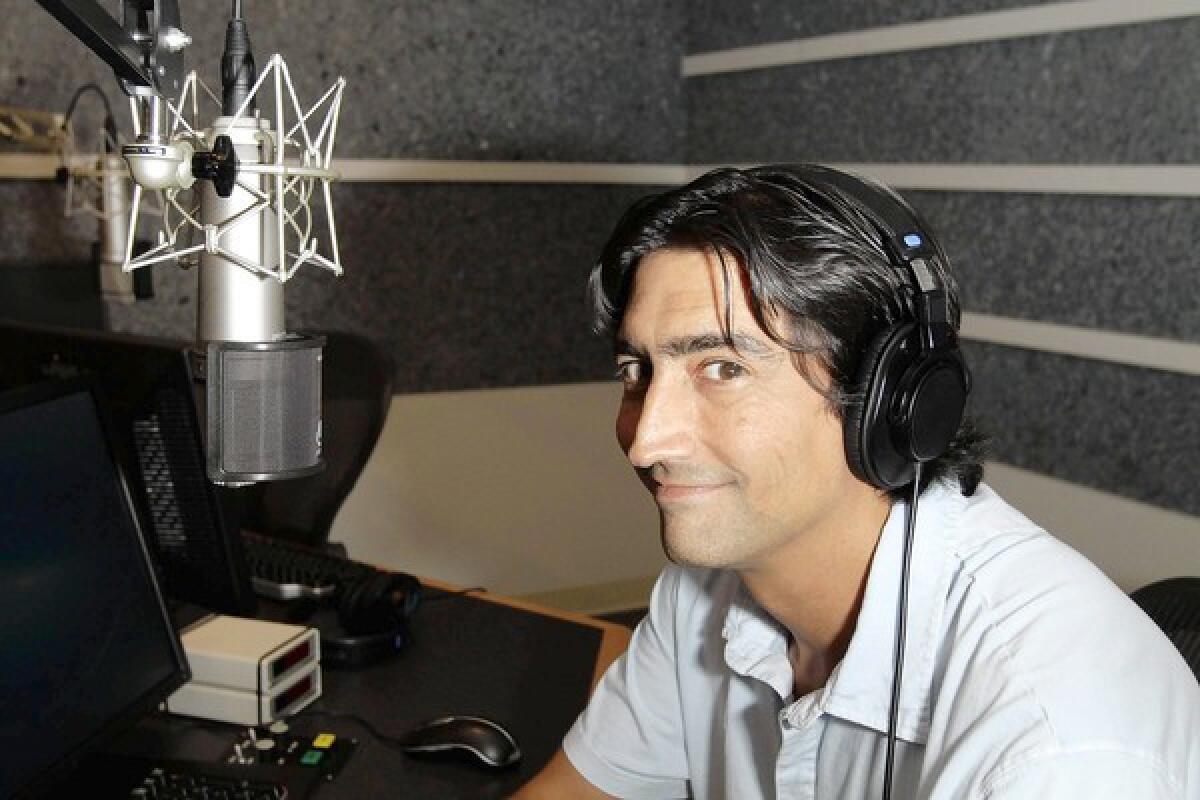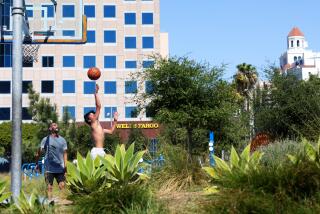NPR moves weekend edition of âAll Things Consideredâ to L.A. area

NPR listeners may notice some new sounds starting Saturday. The radio institution has moved the weekend version of âAll Things Consideredâ to its Los Angeles-area building in hopes of expanding its news scope outside of its hometown, insular Washington D.C.
The show â the only NPR news program to be based in the Culver City office â is relaunching with a new host and new segments. Itâs even replacing its decades-old theme song.
The programâs nine-person staff hopes to use the NPR West facility, a 25,000-square-foot space with furniture and wall art worthy of a Silicon Valley start-up, as a starting point for covering a broader swath of news that will make the program relevant to more listeners.
ON LOCATION: Where the cameras roll
âL.A. kind of reflects America a lot more than Washington does,â said Steve Lickteig, supervising senior producer for the show that has been broadcast from Washington for 36 years. âI think that will come out in the show in ways we havenât thought of yet.â
The decision to move the show, which airs in L.A. on KPCC-FM (89.3) at 5-6 p.m., was also partly driven by the prospect of a disaster, such as last fallâs Hurricane Sandy, knocking out NPRâs news operations. With a substantial team in L.A., NPR could continue to deliver the news through an East Coast blackout.
For the relaunch, the organization brought on Arun Rath, a former reporter for PBSâ âFrontline,â to take over for Guy Raz, who left in December to take another NPR show, âThe TED Radio Hour.â
For Rath, whose previous hosting experience has been limited to a handful of fill-in gigs, one of his main goals is to contribute more of his own reporting from outside the studio, something NPR hosts donât often do.
PHOTOS: Highest-paid media executives of 2012
âThe host is the surrogate for the listener,â Rath said. âI donât want the listeners to stay in that box. I want to take them outside and experience the world.â
This isnât the first time Rath has helped rebrand a public radio program. As a senior producer, he helped lead the 2000 reboot of âOn the Media,â which has tripled its audience.
The audience for Rathâs new show is about 2 million, the smallest among NPRâs major news magazines, while âMorning Edition,â the most listened-to show, reaches more than 13 million listeners. The average person tuning in to the weekend version of âAll Things Consideredâ â which is internally called âWATC,â or âwatt-seeâ â is a white man or woman in his or her mid- to late 50s.
Expanding that reach could prove challenging, given NPRâs continuing budgetary constraints. The organization said last week that it faces a deficit of more than $6 million for the next fiscal year, about 3% of its revenue, and it is offering buyouts to certain employees to shed about 10% of its staff.
RELATED: NPR seeks to reduce staff by 10%, names Paul Haaga Jr. acting CEO
It also recently lost its chief executive, Gary Knell, who spent less than two years on the job before he took an offer to become the CEO of the National Geographic Society. Paul Haaga will serve as acting CEO while the organization searches for a permanent replacement.
Still, putting the show in L.A. is a good move for the organization, both because of the need for a second home to keep the lights on in an emergency and to broaden coverage, said Tom Taylor, an independent reporter who has covered the radio industry for two decades.
âTheyâve got an extremely loyal audience,â Taylor said of NPR. âThey know they need to feed their base but they also need to grow the base.â
The staff has been developing new segments and ideas to make the broadcast sound like itâs coming out of the West Coast.
In a meeting this month, Rath and his team proposed subjects for the debut showâs first âcover story,â typically an 11-minute report on a single topic that opens the broadcast.
âIt would be nice if we could do something particularly relevant to L.A. in that first show, just to get into that atmosphere,â Rath told the assembled staffers.
RELATED: NPR chief Gary Knell is leaving for National Geographic Society
Barring major breaking news, the first broadcasts will feature Rath reporting from Chino for a piece on the U.S. foster care system, and then from the Sunset Strip to examine its diminished influence on the music industry.
Saturdayâs debut will feature a new segment called âThe New & the Next,â in which Carlos Watson of the Mountain View, Calif., Web publication Ozy will discuss upcoming trends and stories.
The group questioned some of the long-adhered-to aspects of the show. Does there really need to be a regular news analyst? Does the cover story always have to be an 11-minute extravaganza? âWhat if the show one time didnât end with a music piece?â Lickteig said. âI think the radio police would come in.â
NPR West, with its 50 employees, also serves as the home base for Renee Montagne, the co-host of âMorning Edition,â which is run primarily from Washington.
The media nonprofit acquired the space in 2002 with big plans to expand its coverage and staff, but those aspirations have been slow to materialize.
Thatâs largely because of the organizationâs budget issues, said Ellen McDonnell, NPRâs executive director of news programming. With Razâs departure and the search for a replacement came the chance to move out West.
âOpportunities come and you grab them,â she said. âEverything is timing and the timing just worked on this one.â
One thing the weekend team still lacks is any journalists who havenât relocated from the East Coast. Lickteig said there are two remaining openings that Rath will be able to fill, possibly with local hires.
And then thereâs the theme song. Lickteig said the idea was to have the first sound listeners hear be something different.
It still has the âAll Things Consideredâ melody, but gone is the trumpet fanfare, replaced by a more soothing, weekend-friendly sequence of jazz piano chords playing with the familiar tune.
âItâs a tricky thing,â Rath said. âWeâre toying with a sacred text, musically.â
More to Read
From the Oscars to the Emmys.
Get the Envelope newsletter for exclusive awards season coverage, behind-the-scenes stories from the Envelope podcast and columnist Glenn Whippâs must-read analysis.
You may occasionally receive promotional content from the Los Angeles Times.











